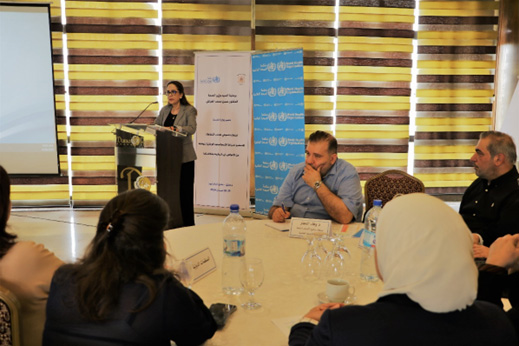 The Syrian Ministry of Health and WHO collaborate on the National Multi-Sectoral Action Plan for prevention and control of NCDs. Photo credit: WHO Syria30 April 2024, Damascus, Syria – In collaboration with the Syrian Ministry of Health, WHO conducted a central meeting from 29 to 30 April to prepare the National Multi-Sectoral Action Plan for prevention and control of noncommunicable diseases (NCDs). Chronic conditions, including cardiovascular diseases, diabetes, respiratory conditions, cancer and mental health disorders, are responsible for an estimated 50–70% of all deaths in Syria.
The Syrian Ministry of Health and WHO collaborate on the National Multi-Sectoral Action Plan for prevention and control of NCDs. Photo credit: WHO Syria30 April 2024, Damascus, Syria – In collaboration with the Syrian Ministry of Health, WHO conducted a central meeting from 29 to 30 April to prepare the National Multi-Sectoral Action Plan for prevention and control of noncommunicable diseases (NCDs). Chronic conditions, including cardiovascular diseases, diabetes, respiratory conditions, cancer and mental health disorders, are responsible for an estimated 50–70% of all deaths in Syria.
The Action Plan is in line with WHO’s regional and global frameworks and aims to promote healthy lifestyles and address the rising prevalence of chronic diseases by targeting risk factors such as tobacco use, unhealthy diet, physical inactivity, harmful alcohol consumption and exposure to air pollution.
 Representatives of the Syrian Ministry of Health and WHO discuss the National Multi-Sectoral Action Plan for prevention and control of NCDs. Photo credit: WHO SyriaDr Iman Shankiti, acting WHO Representative to Syria, said, “This comprehensive strategy prioritizes collaboration among relevant sectors to analyse the current situation, develop a multisectoral national plan and implement joint planning, implementation, monitoring and evaluation to minimize population exposure to preventable risk factors. In the end, we aim to address one of the biggest threats to mortality and morbidity in the country, ensuring better health and longer lives for all people in Syria.”
Representatives of the Syrian Ministry of Health and WHO discuss the National Multi-Sectoral Action Plan for prevention and control of NCDs. Photo credit: WHO SyriaDr Iman Shankiti, acting WHO Representative to Syria, said, “This comprehensive strategy prioritizes collaboration among relevant sectors to analyse the current situation, develop a multisectoral national plan and implement joint planning, implementation, monitoring and evaluation to minimize population exposure to preventable risk factors. In the end, we aim to address one of the biggest threats to mortality and morbidity in the country, ensuring better health and longer lives for all people in Syria.”
At the meeting, participants discussed critical topics, including the need for a national strategy on NCD prevention and control and chronic diseases management. The group also discussed the role of WHO and stakeholders in addressing significant challenges and fostering partnerships to advance health care in Syria, using the life-course approach. This approach aims to improve health outcomes by addressing social, economic and environmental determinants of health across different stages of life, from prenatal care through to older age.
Related links
Noncommunicable diseases: Regional framework for action
Global Coordination Mechanism on the Prevention and Control of NCDs


